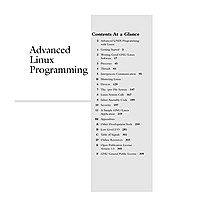
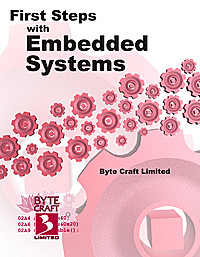
First Steps with Embedded Systems
This book is intended to fill the need for an intermediate level overview of programming microcontrollers using the C programming language. It is aimed specifically at two groups of readers who have different, yet overlapping needs. The first group are familiar with C but require an examination of the general nature of microcontrollers: what they are, how they behave and how best to use the C language to program them. The second group are familiar with microcontrollers but are new to the C programming language and wish to use C for microcontroller development projects. First Steps with Embedded Systems will be useful both as an introduction to microcontroller programming for intermediate level post-secondary programs and as a guide for developers coping with the growth and change of the microcontroller industry.
Memory allocation in C
This article is about dynamic memory allocation in C in the context of embedded programming. It describes the process of dynamically allocating memory with visual aids. The article concludes with a practical data communications switch example which includes a sample code in C.
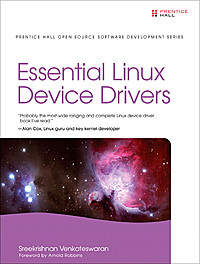
Essential Linux Device Drivers
This book is about writing Linux device drivers. It covers the design and development of major device classes supported by the kernel, including those I missed during my Linux-on-Watch days. The discussion of each driver family starts by looking at the corresponding technology, moves on to develop a practical example, and ends by looking at relevant kernel source files. Before foraying into the world of device drivers, however, this book introduces you to the kernel and discusses the important features of 2.6 Linux, emphasizing those portions that are of special interest to device driver writers.
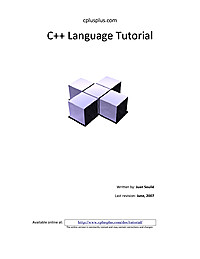
C++ Tutorial
These tutorials explain the C++ language from its basics up to the newest features of ANSI-C++, including basic concepts such as arrays or classes and advanced concepts such as polymorphism or templates. The tutorial is oriented in a practical way, with working example programs in all sections to start practicing each lesson right away
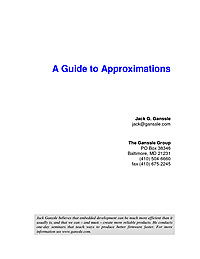
A Guide to Approximations
Most embedded processors don’t know how to compute trig and other complex functions. Programming in C we’re content to call a library routine that does all of the work for us. Unhappily this optimistic approach often fails in real time systems where size, speed and accuracy are all important issues. The compiler’s runtime package is a one-size-fits-all proposition. It gives a reasonable trade-off of speed and precision. But every embedded system is different, with different requirements. In some cases it makes sense to write our own approximation routines. Why?
Memory allocation in C
This article is about dynamic memory allocation in C in the context of embedded programming. It describes the process of dynamically allocating memory with visual aids. The article concludes with a practical data communications switch example which includes a sample code in C.

C++ Tutorial
These tutorials explain the C++ language from its basics up to the newest features of ANSI-C++, including basic concepts such as arrays or classes and advanced concepts such as polymorphism or templates. The tutorial is oriented in a practical way, with working example programs in all sections to start practicing each lesson right away

First Steps with Embedded Systems
This book is intended to fill the need for an intermediate level overview of programming microcontrollers using the C programming language. It is aimed specifically at two groups of readers who have different, yet overlapping needs. The first group are familiar with C but require an examination of the general nature of microcontrollers: what they are, how they behave and how best to use the C language to program them. The second group are familiar with microcontrollers but are new to the C programming language and wish to use C for microcontroller development projects. First Steps with Embedded Systems will be useful both as an introduction to microcontroller programming for intermediate level post-secondary programs and as a guide for developers coping with the growth and change of the microcontroller industry.

Essential Linux Device Drivers
This book is about writing Linux device drivers. It covers the design and development of major device classes supported by the kernel, including those I missed during my Linux-on-Watch days. The discussion of each driver family starts by looking at the corresponding technology, moves on to develop a practical example, and ends by looking at relevant kernel source files. Before foraying into the world of device drivers, however, this book introduces you to the kernel and discusses the important features of 2.6 Linux, emphasizing those portions that are of special interest to device driver writers.

A Guide to Approximations
Most embedded processors don’t know how to compute trig and other complex functions. Programming in C we’re content to call a library routine that does all of the work for us. Unhappily this optimistic approach often fails in real time systems where size, speed and accuracy are all important issues. The compiler’s runtime package is a one-size-fits-all proposition. It gives a reasonable trade-off of speed and precision. But every embedded system is different, with different requirements. In some cases it makes sense to write our own approximation routines. Why?






